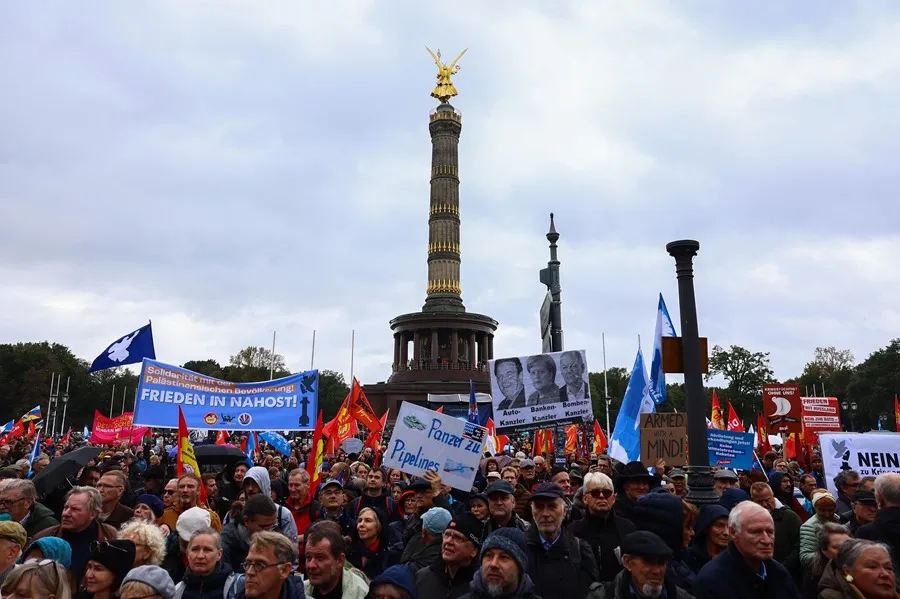International
Germany celebrates 34 years of reunification but with political cracks due to populism

The Germans celebrate 34 years of reunification, a process that ended with the division of the two Germanys, although the recent electoral behavior of the East Germans, where populist parties have become strong, cracks the traditional political scenario of the country.
Behind the festive atmosphere marked by the events of the 34º anniversary of the reunification led by Chancellor Helmut Kohl, a concern weighs the political reality: the booming populism of the far-right Alternative for Germany (AfD) and the leftist Sahra Wagenknecht Alliance (BSW).
The results of these parties in appointments such as the European elections last June or the recent elections of the federal states of Eastern Thuringia, Saxony and Brandenburg, have hit the Central European nation, in which new political divisions between East and West seem to be opening up.
“In 1989, the two Germanys started from different economic and social points and the expectation was that soon there would be an equalization and that would also equalize political points of view,” Martin Schulze Wessel, historian at the University of Munich and expert in Eastern Europe, told EFE.
“At the socio-economic level there is still no equalization, although progress is being made in that direction, but with regard to the vision of politics and political culture, that equalization has not taken place, moreover, there have been new divergences,” he said.
Schulze Wessel alludes to the fact that, after 35 years of the fall of the Berlin Wall, the standard of living in what was the German Democratic Republic (GDR) has increased although the gap between the east and the west is still observed in data such as that the East Germans receive a salary 14% lower than the Westerners, according to data from the Hans Böckler Foundation, a study center specialized in the Teutonic world of work.
This Thursday, in a speech delivered in the city of Schwerin (northeast), Scholz invited to abandon the idea that total equality between east and west in Germany can take place.
“The idea that unification would end completely when the situation in the east would be exactly the same as that in the west, when there is no west that is a single unit, is an idea that does not help us,” Scholz said in the context of the celebration of German Unity Day.
Strong populism in the east
Politically, the east has a different dynamic, as shown by the fact that in the last European elections AfD was – with few exceptions such as Berlin – the most voted force in what constituted the GDR, while in the western territory it swept away the Christian Democratic Union (CDU).
In those elections, the CDU won with 30% of the votes, followed by the AfD, with 15.9%, the Social Democratic Party of Germany (SPD, 13.9%) and The Greens (11.9%).
In the European elections, BSW broke out with 6.7%, a percentage celebrated as a success because that formation was barely a few months old and because, in East Germany, the party of the leftist figure Sahra Wagenknecht managed to be the most voted party, after AfD and the CDU.
According to Daniel Kubiak, a researcher at the Humboldt University of Berlin, told EFE, “we can see that the party system of East Germany differs from the West, because in the west there are still two majority parties (CDU, SPD), which have been joined by the Greens, the FDP and AfD, and it is largely stable.”
“The east is more volatile and people tend to vote for parties located at the ends,” he added.
This, according to Kubiak, is not something unique in Europe, since the vote has also become more volatile in other nations of Europe, such as France, Italy, Poland or Austria, the latter country in which the far-right Freedom Party of Austria (FPÖ) won the legislative elections last Sunday.
The end of the consensus on aid to Ukraine
Among the issues with which AfD and BSW differed in the European elections, but also in the federal states of the east that voted in September, where the far-right formation won in Thuringia, while the Wagenkecht party is emerging as a government partner in Saxony and Brandenburg, is the opposition to military support for Ukraine.
AfD and BSW want Germany to break with the current policy of German Chancellor Olaf Scholz, who has turned his country into the nation in Europe that provides the most military aid to Ukraine.
“The European elections and the elections in the federal states of the east have shown a division and that there are populist parties, the far-right AfD and BSW, that go out of the consensus of the other parties, and there seems to be a rift between east and west,” Schulze Wessel concluded.
International
Colombia to Send High-Level Delegation to Ecuador to Ease Trade Tensions

Colombia’s Ministry of Foreign Affairs confirmed on Friday that, at the instruction of President Gustavo Petro, a high-level delegation will travel to Ecuador in an effort to normalize bilateral relations, which have deteriorated following the imposition of reciprocal tariffs.
“In line with Colombia’s policy of good neighborliness and the spirit of cooperation and integration that guides its foreign policy,” the Foreign Ministry said in a statement, adding that the delegation will be led by Foreign Minister Rosa Villavicencio and Defense Minister Pedro Sánchez.
“Following instructions from the Presidency of the Republic, and as has been publicly reiterated, the Colombian delegation expects to reaffirm Colombia’s offer of support to the Republic of Ecuador to strengthen control over phenomena stemming from transnational organized crime,” the statement said.
The Foreign Ministry noted that the delegation will attend the meeting with a full willingness to engage in dialogue and to seek concrete solutions to the unilateral measures that have affected the longstanding relationship between the two neighboring countries.
Trade tensions between Ecuador and Colombia escalated on January 21, when Ecuadorian President Daniel Noboaimposed a 30% tariff on Colombian products, citing a lack of cooperation in anti-drug efforts. Colombia responded with similar measures and the suspension of energy exports, while Ecuador increased transportation costs for Colombian crude oil.
Business associations in both countries have warned that the dispute is harming both economies and have called on the governments to resolve their differences through dialogue.
International
Super Bowl Halftime Show Puts Bad Bunny—and Immigration Politics—Back in the Spotlight

The long-standing argument that sports and politics should not mix may be put to the test on Sunday during the Super Bowl halftime show, which will be headlined by Puerto Rican superstar Bad Bunny, a choice that has sparked backlash from segments of the U.S. right wing.
Just one week after his headline-making appearance at the Grammy Awards—where he sharply criticized the United States’ anti-immigration policies—Bad Bunny will once again take center stage on the global spotlight with his performance at the NFL final in Santa Clara, California.
Beyond the expectations surrounding the show itself, speculation has grown over whether the artist could again use the platform to protest policies associated with the administration of former President Donald Trump, in front of an audience expected to exceed 120 million viewers in the United States alone.
In fact, one of the most popular Super Bowl prop bets this year revolves around whether the Puerto Rican singer will deliver a direct message against ICE (U.S. Immigration and Customs Enforcement), similar to the one he delivered at the Grammys last Sunday.
While few expect Bad Bunny to repeat such a pointed statement, the mere speculation highlights the delicate balance the NFL must manage during the most-watched broadcast of the year.
The world’s most powerful sports league has drawn criticism from the MAGA movement since announcing in September that Bad Bunny would headline a halftime show largely performed in Spanish.
Trump himself declined to attend the matchup between the New England Patriots and the Seattle Seahawks, despite having made history last year as the first sitting U.S. president to attend a Super Bowl. He described the musical lineup—which also includes outspoken critics such as Green Day—as “a terrible choice” that would “sow hatred.” In response, his supporters have organized an alternative event dubbed the “All-American Halftime Show,” featuring like-minded artists such as Kid Rock.
International
Venezuela Debates Broad Amnesty Law Covering 27 Years of Chavismo

Venezuela’s Parliament began debating on Thursday a sweeping amnesty bill that would cover the 27 years of Chavismo in power, while explicitly excluding serious human rights violations and crimes against humanity.
The proposed legislation, titled the “Amnesty Law for Democratic Coexistence,” was introduced by interim President Delcy Rodríguez, who assumed power following the capture of Nicolás Maduro during a U.S. military operation.
The legislative session was convened for Thursday afternoon, with lawmakers holding an initial discussion focused on the general principles of the bill. This phase precedes a consultation process with civil society, after which the proposal will move to a final debate examining each article individually.
According to a draft of the bill obtained by AFP, the amnesty would apply to individuals accused of crimes such as “treason,” “terrorism,” and “incitement to hatred,” charges that were frequently brought against political prisoners over the past decades. The scope also includes offenses ranging from acts of rebellion to punishments imposed for social media posts or messages sent through private messaging services.
The bill’s explanatory text emphasizes reconciliation, stating that it seeks to move away from “vengeance, retaliation, and hatred” in favor of “opening a path toward reconciliation.”
However, the proposal explicitly excludes from its benefits crimes such as “serious human rights violations, crimes against humanity, war crimes, intentional homicide, corruption, and drug trafficking.”
These exclusions, the text notes, are based on strict compliance with the Venezuelan Constitution, which already prohibits granting amnesties or pardons for such offenses.
-

 International5 days ago
International5 days agoEpstein Denies Being ‘the Devil’ in Newly Released Video Interview
-

 International5 days ago
International5 days agoSpain Seeks to Ban Social Media Access for Children Under 16
-

 International4 days ago
International4 days agoDelcy Rodríguez Takes Control of Chavismo as Venezuela Enters a U.S.-Supervised Transition
-

 International5 days ago
International5 days agoPetro Resumes Extraditions, Sends Top Criminal to U.S. Before White House Talks
-

 International5 days ago
International5 days agoMexico to Send Humanitarian Aid to Cuba Amid U.S. Threats Over Oil Shipments
-

 International4 days ago
International4 days agoHRW Warns Trump’s Influence Has Weakened Human Rights in Latin America
-

 International5 days ago
International5 days agoMexico Arrests Suspect in Shooting of Sinaloa Lawmakers
-

 International5 days ago
International5 days agoHypothermia Linked to Most Deaths During New York’s Recent Cold Spell
-

 International3 days ago
International3 days agoDíaz-Canel Calls for Talks With Washington Without Pressure as U.S. Tightens Oil Sanctions
-

 Central America3 days ago
Central America3 days agoPanama Will Not Be Threatened, President Says Amid Rising Tensions With China
-

 International3 days ago
International3 days agoVenezuela Debates Broad Amnesty Law Covering 27 Years of Chavismo
-

 International2 days ago
International2 days agoColombia to Send High-Level Delegation to Ecuador to Ease Trade Tensions
-

 Central America5 days ago
Central America5 days agoLaura Fernández Says She Will ‘Never’ Allow Authoritarianism in Costa Rica
-

 Central America3 days ago
Central America3 days agoBukele’s Approval Rating Climbs to 91.9% in El Salvador, Survey Shows
-

 Central America14 hours ago
Central America14 hours agoSalvadoran fans plan birthday surprise for Shakira at historic show
-

 International5 days ago
International5 days agoNFL Investigating Emails Linking Giants Executive to Jeffrey Epstein
-

 Sports11 hours ago
Sports11 hours agoShakira ignites El Salvador with near sold-out residency at Mágico González Stadium
-

 International2 days ago
International2 days agoSuper Bowl Halftime Show Puts Bad Bunny—and Immigration Politics—Back in the Spotlight


























